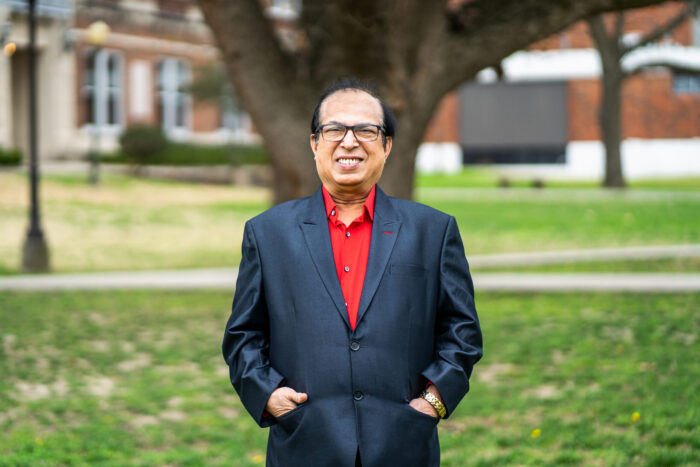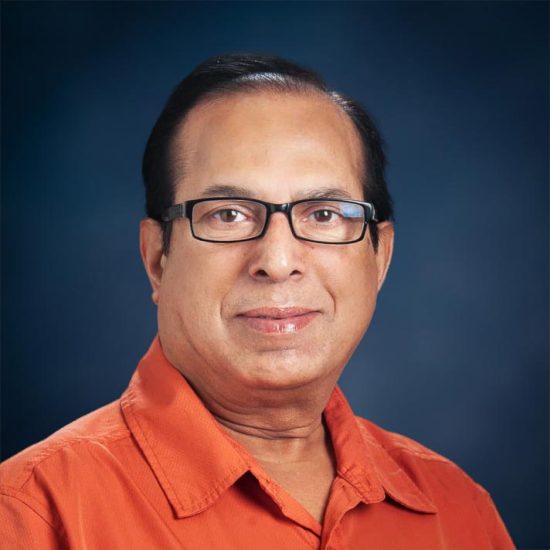
Some would say diamonds last forever, I say, statistics and mathematics last forever!
Kishor Kumar Guru-Gharana, Ph.D. Professor of Economics
- Faculty

Kishor Kumar Guru-Gharana is not your typical economics professor. He started teaching graduate students in 1981 in his homeland of Nepal. In 1983, Guru-Gharana received a Fulbright U.S. scholarship to complete his Ph.D. in the US. He chose Southern Methodist University because of the people and the booming place it was becoming. In four years, Guru-Gharana completed his Ph.D. in Economics and wanted to pursue a second one in finance, but he couldn't, as the government wouldn't allow him. Guru-Gharana went back to Nepal after completing a Masters in Finance from the University of Texas at Dallas, but he never stopped wanting to come back to the US. After eight years of being away from the US, Guru-Gharana decided it was time to go back. It took him only three months to receive a Green Card, but once he got here, it wasn't easy for him to find an academic job. It took him over a year to find one. In the meantime, Guru-Gharana worked at a gas station. His first academic position was at McNeese State University, Louisiana. Hurricane Rita came through his area and destroyed his home. Moreover, the state was in financial trouble. As a consequence, Guru-Gharana needed another option and he found East Texas A&M out of several university offers. He knew that Texas is where he wanted his family to be. It was in 2009 when Guru-Gharana joined the faculty at East Texas A&M as an Associate Professor. In 2014, he received a tenured position with a promotion to Full Professorship. He loves where he works and wouldn't have it any other way.
A Conversation with Dr. Guru-Gharana
What would you tell a student who is thinking about attending East Texas A&M?
One thing that students will notice when they attend East Texas A&M is that teachers take care of their students. We give individual attention to each student unlike other universities due to our size. We take pride in having personal interactions with our students so we can understand where they are in their learning. Even in online courses, we make sure to take care of our students. We have unique characteristics that make us care about our student's education and their success with us. I tend to watch over students who are struggling because I don't want them to fall behind the rest. Another big thing that students will notice in the Department of Management and Economics is that we have very high-level talent. Many of our faculty have publications in reputable journals. Also, they are very active, friendly and helpful. Students who attend East Texas A&M will have a unique experience and become a member of a family.
What has been your favorite course to teach?
I have taught statistics for such a long time. I love it, it is universally applicable knowledge. You can use statistics in business, medicine, finance, management: The list goes on. All the research in this world is done using Statistics. Not only is it universal knowledge, but it is also eternal. For example, once you learn normal distribution, it will stay valid forever. It will never get old. So why not learn something that is forever? Some would say diamonds are forever, I say, statistics and mathematics are forever. They are the only two subjects that last forever. Numbers are the most common language we use. We have numbers to understand our body function, our net worth, in the environment and all business situations. Technically, we are numbers in the system, and it’s with that number, we can trade things. The whole world is run by numbers. Moreover, Statistics adds probability or uncertainty aspect to numbers, which is even more relevant than simple mathematics, in this increasingly uncertain world.
Tell us about a project you are currently working on or recently completed.
I would like to understand the stock market. How are they related to the world economy? Right now, the stock market is behaving as if it does not have much relation with the real-world economy. The real-world economy has several negative things currently happening, yet the stock market behaves like it doesn't care. Interestingly enough, on the days or weeks when COVID cases were high, the stock prices went up. It's doesn't make much sense! The stock prices would have gone down because people are not able to buy or to work. The only thing that comes to mind on why this is occurring is investors are thinking about the future. They are expecting that in the future, the economy will come back to normal, but this may be a false promise. A similar situation happened between the years 2007-2009. Some people created a false hope that the economy would get better when, in fact, it did not. With this said, I would like to understand if there is still a real relation between the real economy and the financial economy. I might find that there is no longer any meaningful or predictable relationship between the two. If there is a relationship, then we can do something about it, but if not, then there may not be much we can do, except playing the game of pumping money and unrealistically, boosting hopes for future.
Educational Background
- Ph.D., Econometrics and International Trade, Southern Methodist University,1987
- M.S., Finance, University of Texas-Dallas, 1989
- M.A., Econometrics, Southern Methodist University, 1985
- M.A., Mathematical Economics, Tribhuvan University, 1981
- B.A., Economics and Mathematics, Tribhuvan University, 1973
Academic Positions
- Professor, Department of Management and Economics, ETAMU, 2015-Present
- Associate Professor, Department of Business Administration and MIS, TAMUC(now ETAMU), 2009-2015
- Assistant Professor, McNeese State University, 2003–2009
- Founding Dean/Principal, Capital College and Research Center, 2001
- Associate Professor, Department of Economics, Tribhuvan University, 1981-2001
Awards and Honors
- Research Award among Associate Professors of COB, TAMUC(now ETAMU), 2011-2012
- Teaching Excellence Award, TAMUC(now ETAMU), 2011-2012
- Faculty Excellence Award, J P Morgan Chase- McNeese State University, 2009-2010
- Teaching Excellence Award, Texas A&M System, 2009-2010
- Distinguished Research Award, Allied Academies International Conference. Economics of Resource Based and Dynamic Capabilities View: A Contemporary Framework, 2008-2009
- Distinguished Research Award, Allied Academies International Conference, 2006-2007
- Business Excellence award, Bank One – McNeese State University, 2006-2007
- Faculty Excellence Award, Powell Group- McNeese State University, 2005-2006
- Excellent Academic Performance, Phi Beta Kappa Honor Society chapter at Southern Methodist University,1985-1986
- Merit Scholar, The Economics Institute, 1983-1984
- Fulbright Scholarship, Fulbright Commission American at Nepal, 1983-1984
- Gold Medal, Tribhuvan University, 1980-1981
Research Interests
- Econometrics Tools
- Business
- International Finance
Professional Organizations
- AACSB Certified Post-Doctoral Bridge to Business Program, 2009
- Master Teacher Conference, 2007
Featured Courses
ECO 578 Statistical Methods
ECO 302 Business and Economics Statistics
ECO 501 Economics for Decision Makers
ECO 331 Intermediate Macroeconomics
ECO 502 Quantitative Analysis for Managers


